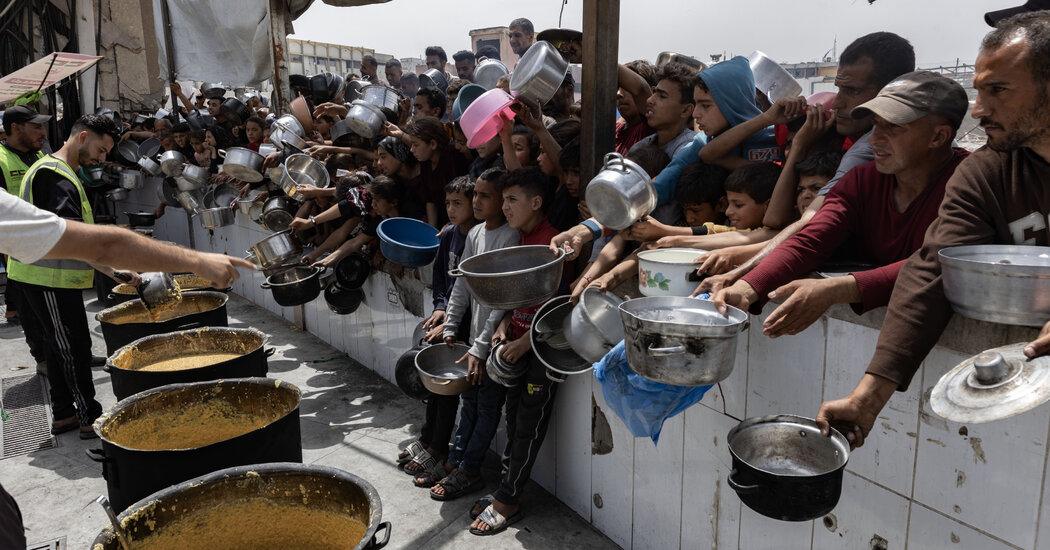Israeli authorities are floating a new plan to allow desperately needed international aid into Gaza, under their control, after blocking the deliveries for more than two months.
But many of the humanitarian groups that would have to work under the proposed system say Israel’s conditions would turn aid into a military pressure tactic and violate the groups’ principles of neutrality.
The idea for the new aid mechanism surfaced just as Israeli leaders were threatening to significantly escalate their offensive in Gaza, even though more than a year and a half of war has failed to either defeat the territory’s Hamas rulers or bring home all of the hostages still held there.
Israel’s barring of food and medicine shipments into Gaza has prompted calls from the international community — including allies — to end the blockade.
But Israeli officials have dug in, arguing that they are pressing Hamas to free the remaining hostages. They have also repeatedly accused Hamas of diverting aid for its own fighters rather than allowing it to reach hungry Palestinian civilians, which Hamas denies.
What is Israel proposing?
The Israeli military said that its coming escalation would involve the displacement of most of Gaza’s population to zones “clean of Hamas,” which would be filtered by Israeli forces to weed out any members of the militant group.
Under the new system, the Israeli military would secure and monitor the distribution of aid to Palestinians in a series of hubs inside Gaza, according to Israeli officials, diplomats and aid groups familiar with the proposal.
The United Nations and other aid groups have criticized the proposal and suggested they will not cooperate. And some critics in Israel fear the plan would bring the country one step closer to re-establishing Israeli military rule over Gaza — a dream of hard-liners on the Israeli right wing.
Israel has declined to publicly lay out the humanitarian proposals in detail. Israeli officials have generally briefed aid groups verbally to avoid putting their plan into writing, according to three officials familiar with the discussions.
On Sunday, the United Nations and a coalition of humanitarian groups said in a joint statement that Israeli officials were seeking to shut down the existing aid system and force aid groups to “deliver supplies through Israeli hubs under conditions set by the Israeli military” once the government agreed to reopen the border crossings into Gaza.
Under the proposal, private companies would manage the delivery of aid within the hubs secured by Israeli forces, two Israeli officials said. They spoke on condition of anonymity because they were not authorized to speak publicly.
What is the humanitarian situation in Gaza?
When Israel and Hamas agreed to a cease-fire in mid-January, Palestinians voiced hopes that they would at last enjoy a respite from the dire conditions in Gaza.
For more than a year, hundreds of thousands of Gazans displaced by the war had huddled in tents and makeshift shelters. Finding enough food and clean water was a daily struggle. Meager provisions were hawked in street markets at eye-watering prices.
During the truce, Israel agreed to allow hundreds of trucks of aid and commercial goods into Gaza each day, bearing fresh fruit, frozen meat, and enough flour to drive down the price of bread. But it didn’t last.
In early March, the Israeli government announced that it was closing the crossings into Gaza to aid, citing the deadlock in talks with Hamas over the next steps in the truce. Two weeks later, Israel ended the cease-fire with a massive bombardment across the territory.
The Israeli blockade has been in place for more than two months. Israeli officials say Gaza has enough provisions to last for some time, even as aid officials warn that the blockade could ultimately lead to famine.
“Blocking aid starves civilians. It leaves them without basic medical support. It strips them of dignity and hope,” Tom Fletcher, the top United Nations aid official, said in early May.
Why have aid groups criticized Israel’s proposal?
Relief officials have said the Israeli plan would effectively leave much of Gaza — the parts of it without hubs — without any supplies. It would also essentially allow Israel to control the supply of critical aid and use it as leverage.
“It contravenes fundamental humanitarian principles and appears designed to reinforce control over life-sustaining items as a pressure tactic — as part of a military strategy,” the United Nations said in its joint statement with other humanitarian organizations.
The organizations also argued that if they agreed to provide aid in the Israeli military zones, they might effectively abet Israel’s forced mass displacement of Palestinians as part of the initiative.


